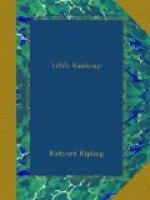They sat down by the low white parapet of the roof, overlooking the city and its lights.
‘They are happy down there,’ said Ameera. ’But I do not think that they are as happy as we. Nor do I think the white mem-log are as happy. And thou?’
‘I know they are not.’
‘How dost thou know?’
‘They give their children over to the nurses.’
‘I have never seen that,’ said Ameera with a sigh, ’nor do I wish to see. Ahi!—she dropped her head on Holden’s shoulder,—’I have counted forty stars, and I am tired. Look at the child, love of my life, he is counting too.’
The baby was staring with round eyes at the dark of the heavens. Ameera placed him in Holden’s arms, and he lay there without a cry.
‘What shall we call him among ourselves?’ she said. ’Look! Art thou ever tired of looking? He carries thy very eyes. But the mouth—’
‘Is thine, most dear. Who should know better than I?’
’’Tis such a feeble mouth. Oh, so small! And yet it holds my heart between its lips. Give him to me now. He has been too long away.’
‘Nay, let him lie; he has not yet begun to cry.’
’When he cries thou wilt give him back—eh? What a man of mankind thou art! If he cried he were only the dearer to me. But, my life, what little name shall we give him?’
The small body lay close to Holden’s heart. It was utterly helpless and very soft. He scarcely dared to breathe for fear of crushing it. The caged green parrot that is regarded as a sort of guardian-spirit in most native households moved on its perch and fluttered a drowsy wing.
‘There is the answer,’ said Holden. ’Mian Mittu has spoken. He shall be the parrot. When he is ready he will talk mightily and run about. Mian Mittu is the parrot in thy—in the Mussulman tongue, is it not?’
‘Why put me so far off?’ said Ameera fretfully. ’Let it be like unto some English name—but not wholly. For he is mine.’
‘Then call him Tota, for that is likest English.’
’Ay, Tota, and that is still the parrot. Forgive me, my lord, for a minute ago, but in truth he is too little to wear all the weight of Mian Mittu for name. He shall be Tota—our Tota to us. Hearest thou, O small one? Littlest, thou art Tota.’ She touched the child’s cheek, and he waking wailed, and it was necessary to return him to his mother, who soothed him with the wonderful rhyme of Are koko, Jare koko! which says:
Oh crow! Go crow!
Baby’s sleeping sound,
And the wild plums grow
in the jungle, only a penny a pound.
Only a penny a pound,
baba, only a penny a pound.
Reassured many times as to the price of those plums, Tota cuddled himself down to sleep. The two sleek, white well-bullocks in the courtyard were steadily chewing the cud of their evening meal; old Pir Khan squatted at the head of Holden’s horse, his police sabre across his knees, pulling drowsily at a big water-pipe that croaked like a bull-frog in a pond. Ameera’s mother sat spinning in the lower verandah, and the wooden gate was shut and barred. The music of a marriage-procession came to the roof above the gentle hum of the city, and a string of flying-foxes crossed the face of the low moon.




